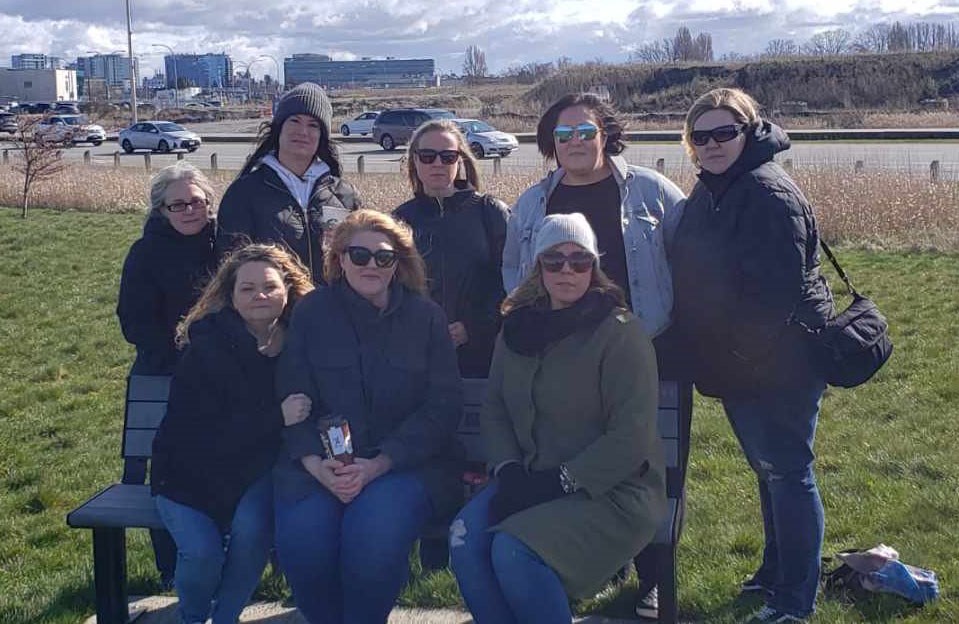They knew that no severity of sentence would bring her back or even dull the pain of their loss.
Family and friends of Christy Mahy had fought in her memory for seven years, waiting patiently for the day the reckless driver, who caused her death at a Richmond intersection in 2014, faced justice.
On Monday, they finally got their chance, when Erjon Kashari — an Albanian refugee claimant who entered Canada in 2010 with a serious criminal record — was sentenced in a Richmond court to just over two years for criminal negligence causing Christy’s death.
Numb from several days of listening to how tough Kashari’s life had been and licking the salt from their collective emotional wounds, Christy’s family and friends left the courtroom and headed straight to the spot near Russ Baker Way and the Dinsmore Bridge where she died on the sidewalk, waiting for the lights to change.
While sitting on Christy’s memorial bench near the accident site, they questioned how the man that robbed them of their beloved daughter, sister and close friend could only get sentenced to time already served in prison, allowing him to jump back on a Canada-paid flight to his native Albania.
An hour or so later, while talking to the Richmond News from the nearby pub where Christy used to work, her sister Joni — fighting back her anger and tears — highlighted a catalogue of bigger question marks that continue to haunt the handling of the entire case.
A simple tracing of Kashari’s footsteps, from when he entered Canada in 2010 to his extradition from Albania in 2020, appears to reveal a series of errors or shortcomings in a system that has clearly let Christy and her family down.
Why was Kashari allowed to enter Canada and apply for refugee status when he had been deported a year earlier from the U.K., on the back of seven years building up a criminal record for assaults, burglary, theft, holding his wife hostage and beating her up?
Why was he allowed to revoke his refugee claim, apparently without cause, a month after causing Christy’s death, triggering a deportation order to Albania?
Why did the RCMP not prevent the CBSA from deporting Kashari while the investigation into Christy’s death was ongoing?
Did the CBSA make more than one call to the RCMP to ask if there was any reason Kashari should not be deported?
Why did it take the RCMP more than two years to complete the investigation and file its report and recommendation with the BC Prosecution Service (BCPS)? (BCPS told the News this week it didn’t receive the file from the RCMP until August 2016.)
Why have 16 court dates in nine months for Kashari from the day he was extradited back to Canada in 2020, with family and friends taking time off work to attend?
Do any of the above spell justice for Christy and her family?
The News has followed this tragedy from the outset, reporting each and every year how Christy’s father, Ron, organized a motorbike parade on the anniversary of his daughter’s death.
Every year, myself and several colleagues have picked up the phone to Ron and listened intently to his anguish and raw emotion as he relived the agony once more.
Until Kashari was charged in his absence in 2018, Ron fought hard, in vain, to get answers from authorities to many of the questions, as did the News.
Two days after the case finally closed, we are still waiting to hear the answers.
One has to also ponder whether this day would have even come to pass if Ron had, understandably, wanted to get on with his life and accept the tragedy as an accident.
In the end, it all comes down to what we, as a society, deem acceptable.
Is it acceptable that those questions still hang over this sad, seven-year episode?
At some point there has to be accountability and, indeed, change, likely via pressure from our elected MLAs or MPs.
Otherwise, there’s a good chance another family is going to experience the deep-seated pain of what the Mahys have endured for the last seven years.



.jpg;w=120;h=80;mode=crop)
